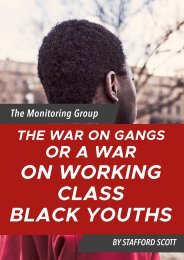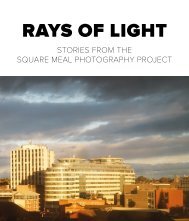Coming of Age : 1976 and the Road to Anti-Racism
Coming of Age : 1976 and the Road to Anti-Racism by Jagdish Patel and Suresh Grover
Coming of Age : 1976 and the Road to Anti-Racism
by Jagdish Patel and Suresh Grover
Create successful ePaper yourself
Turn your PDF publications into a flip-book with our unique Google optimized e-Paper software.
published short fiction <strong>and</strong> non-fiction pieces by a range <strong>of</strong> writers; Changing Britannia: life<br />
experience with Britain, edited by Roxy Harris <strong>and</strong> Sarah White (1999)(24) encompasses narratives<br />
by <strong>and</strong> interviews with seven ‘prominent figures’.<br />
Slightly <strong>to</strong> one side st<strong>and</strong>s Black British Culture & Society: a text reader edited by Kwesi<br />
Owusu (2000), which, while reflecting <strong>the</strong> interest in <strong>the</strong> cultural development <strong>of</strong> Black Britain,<br />
included within its forty-two contributions key his<strong>to</strong>rical political pieces by Claudia Jones<br />
<strong>and</strong> Obi Egbuna, Paul Gilroy’s ‘Black Atantic’ <strong>the</strong>sis <strong>and</strong> a strong hearing from Black women<br />
as well as original interviews debating ‘Black’ with Stuart Hall, <strong>and</strong> A. Sivan<strong>and</strong>an (<strong>the</strong> latter<br />
reproduced in this issue <strong>of</strong> Race & Class). It should be noted that <strong>the</strong> eminent black scholars<br />
Stuart Hall <strong>and</strong> Paul Gilroy have primarily, in <strong>the</strong>ir many publications, discussed ‘Black’ as cultural<br />
<strong>the</strong>orists. But, although <strong>the</strong>ir focus has not been on <strong>the</strong> period under review here, both<br />
have written key texts on young black men <strong>and</strong> <strong>the</strong> state/policing in, respectively, Policing<br />
<strong>the</strong> crisis: mugging, <strong>the</strong> state <strong>and</strong> law <strong>and</strong> order (1978) <strong>and</strong> ‘Steppin’ out <strong>of</strong> Babylon’ in The<br />
Empire Strikes back: race <strong>and</strong> racism in 70s Britain (1982). Paul Gilroy’s The Black Atlantic:<br />
modernity <strong>and</strong> double consciousness (1993), published well after Black had ceased <strong>to</strong> be a<br />
political colour, can be seen as a useful (if ra<strong>the</strong>r <strong>the</strong>oretical) framing <strong>of</strong> <strong>and</strong> antidote <strong>to</strong> <strong>the</strong><br />
essentialism <strong>and</strong> nationalism <strong>of</strong> <strong>the</strong> time.<br />
Students dipping in<strong>to</strong> later reference <strong>to</strong>mes such as <strong>the</strong> beautifully produced Black<br />
Britain: a pho<strong>to</strong>graphic his<strong>to</strong>ry by Paul Gilroy <strong>and</strong> Stuart Hall (2007) or The Oxford Companion<br />
<strong>to</strong> Black British His<strong>to</strong>ry by David Dabydeen, John Gilmore <strong>and</strong> Cicely Jones (2007) will<br />
be disappointed. Though <strong>the</strong> first is evocative <strong>and</strong> thus emotionally charged, it says next<br />
<strong>to</strong> nothing about Black Power as political agency; (25) <strong>the</strong> second, organised as a kind <strong>of</strong><br />
dictionary <strong>of</strong> world events <strong>and</strong> people, is not just patchy in coverage but necessarily without<br />
coherence or narrative.<br />
However, two recently published memoirs from erstwhile Black Power activists may<br />
prove more fruitful. The first by Wins<strong>to</strong>n Trew, one <strong>of</strong> <strong>the</strong> (Black Power activist) Fasimbas<br />
in <strong>the</strong> 1972 ‘Oval 4 case’, Black for a Cause … Not Just Because: <strong>the</strong> case <strong>of</strong> <strong>the</strong> ‘Oval 4’ <strong>and</strong><br />
<strong>the</strong> s<strong>to</strong>ry <strong>of</strong> Black Power in 1970s Britain (2010) amongst o<strong>the</strong>r things graphically recalls in<br />
a telling chapter experiences at <strong>the</strong> h<strong>and</strong>s <strong>of</strong> <strong>the</strong> police. The second book, a biography <strong>of</strong><br />
activist Darcus Howe, largely based on interviews with him, partner Leila Hassan <strong>and</strong> friend<br />
Farrukh Dhondy, is more problematic. All renderings <strong>of</strong> his<strong>to</strong>ry, especially from its protagonists,<br />
are going <strong>to</strong> be partial (Wins<strong>to</strong>n James, for example, finds Sivan<strong>and</strong>an a romantic (26),<br />
but this hagiographic rendering in a political biography by Robin Bunce <strong>and</strong> Paul Field (2013)<br />
tends <strong>to</strong> conflate one man’s s<strong>to</strong>ry with <strong>the</strong> his<strong>to</strong>ry <strong>of</strong> <strong>the</strong> time. Without doubt Howe, a former<br />
Black Pan<strong>the</strong>r, was involved in key moments <strong>of</strong> Black his<strong>to</strong>ry – from <strong>the</strong> 1970 uprising in<br />
Trinidad <strong>to</strong> <strong>the</strong> Mangrove trial, <strong>the</strong> editing <strong>of</strong> Race Today <strong>to</strong> <strong>the</strong> Black People’s Day <strong>of</strong> Action<br />
– <strong>and</strong> was influential for some years (27) but in this retelling <strong>of</strong> his<strong>to</strong>ry through Howe’s<br />
<strong>Coming</strong> <strong>of</strong> <strong>Age</strong> | 185<br />
<strong>Coming</strong> <strong>of</strong> <strong>Age</strong> Final version 16.10.indd 185 17/10/2017 12:08







